> Events
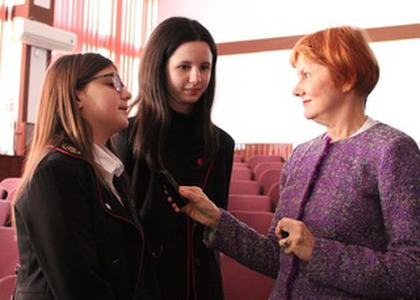
Reportage - "Listen to 5 Minutes of Classical Music" at "Costache Negruzzi" National College in Iași
In March, Cristina Comandașu visited Iași for a series of events organized by Radio România Muzical. As part of her visit, Cristina Comandașu made a stop at one of the high schools in Iași participating in the "Listen to 5 Minutes of Classical Music" project.
On March 4th, I was invited to the "Costache Negruzzi" National College in Iași, one of the project partners for "Listen to 5 Minutes of Classical Music". I had the pleasure of meeting talented, passionate students and spoke with them about the impact of this Radio România Muzical initiative.
"Music can evoke certain feelings and emotions that we may not be able to express in words. I can say this from personal experience-I started learning piano twelve years ago, and I haven't stopped studying since. At first, I thought music was just about being on stage, receiving applause, and expressing myself through sound. But I've come to realize it's so much more. It's not just a performance-it's about connecting hearts. I believe this project awakens that very feeling in students, reinforcing the idea that music is all around us and is crucial for our development."
"My name is Teodor. I'm a 12th-grade student in B classroom, and I've been playing the piano since I was six. I've noticed that among younger generations, classical music is largely absent. Students tend to listen more to contemporary genres-rap, trap-but not classical music, which, in my opinion, is a loss. As my classmate said, classical music stirs emotions, states of mind-it's about culture, about history. It's essential for the harmonious development of young people.
Through your project, I believe that if a student happens to hear those five minutes of classical music, it can spark a feeling of connection or even an inner awakening that might lead them to explore more, and eventually fall in love with the emotions that this music inspires."
"Our music teacher recommended this program to us in class. It really enriches our musical culture, and I believe it's important-especially since, as my peers have mentioned, people our age often prefer other genres. Classical music actually integrates so many disciplines-starting with history, which is essential for us."
Do you have any favorites from the pieces proposed this year or last year?
"For me, one of the works that stood out was Chopin's Nocturne."
Why?
"I don't know, it brought about a feeling of vulnerability. For me, music is an expressive language-it helps you see the world through the eyes of your soul and expand your musical horizons."
"I believe that by listening to classical music, we enter into a deep synergy with the complex universe of musical classicism. Even listening to just five minutes can make us feel what the composers felt, can make us connect to the essence of those incredible works. Just like those who once gathered to listen to classical music, we seek moments of beauty and peace, a profound connection with the music."
"I really enjoyed Beethoven's Fifth Symphony. It conveys such powerful emotions-so dramatic, so evocative."
One of the students from the Negruzzi College, currently preparing for medical school entrance exams, also gave a talented performance of a segment from Claude Debussy's Arabesque.
We also touched on more current topics:
We all see that, often, even at high school balls hosted by prestigious schools around the country, the music played ends up being manele. Why is that? You're the generation in question-how do you see it?
"I think these genres serve different purposes. It also depends on the individual, their previous exposure to various types of music. Some may simply resonate more with one style than another. Still, from my perspective, classical music is a universal language. Even without lyrics, just through sound and vibration, through instruments alone, it can convey far deeper and more nuanced emotions than music meant primarily for entertainment."
There's a lot of talk about music being just entertainment. I often hear-even from those in education-that it's hard to bring classical music into the classroom, even though it's part of the curriculum. People tend to say, "I'll just listen to the music I like." But how much does that say about us? How much does the music we enjoy define who we are?
"I think it's important to understand all stages in the history of music-there's something to learn from each. I truly believe classical music should be taught at all levels of education because it speaks to our cultural foundation. It opens up new genres for us to discover and potentially fall in love with. Sometimes we only listen to certain genres because of the people around us-we haven't been exposed to anything else. Musical education helps us discover who we really are, and what we genuinely like."
Alina Țirică, music teacher at the "Costache Negruzzi" National College-How helpful is this project in the classroom?
"It's extremely valuable. It's become a sort of ritual-our 'Listen to 5 Minutes of Classical Music' moment. The students now ask me: 'Are we listening to the five minutes today?' Of course, we don't do it every single week, but I encourage them to listen at home. Some students tell me: 'This week's piece really touched me. I learned something new.' It's also a great starting point when I introduce composers like Mozart or Beethoven. They find out a lot of things that they enjoy. They already know a few things, and we can build on that. We use the project as a launchpad-for discussions, for debates, sometimes immediately in class, sometimes in future lessons."
You have some incredible students here-bright minds, the future intellectuals of Romania. Why is it especially important today that they receive a solid cultural education?
"Yes, it's absolutely essential to set out on this life's journey with such an education. Generally speaking, a well-rounded student is also musically inclined. It's well known-the top math or the Romanian language student is often also in the school choir. I'd like to emphasize that here at Negruzzi College, music is alive-we're part of the national Cantus Mundi program. There's real enthusiasm for music here. We don't just attend concerts-we have a musical energy within the school. We collaborate closely with the Art High School and the 'George Enescu' University of Arts here in Iași. There's always a reason to bring classical music into the spotlight. And we need it-now more than ever. The world seems to be heading in another direction: Actually, we're not talking about sensitivity anymore, we're talking about noise, chaos, turbulence. That's not what we want. As music teachers, this is our mission. We're not just present-we don't just teach theory. I mean, yes, we could talk about a 'perfect fourth' interval... but that won't mean much unless we bring it to life. For me, a fourth means a string quartet. That's how I teach: I talk about Ad Libitum Quartet, Voces Quartet, that is a string quartet-because they live here in Iași. The students need to know that a fourth means four musicians-and nothing more."
Photo gallery:
 |
 |
 |
 |
 |
 |
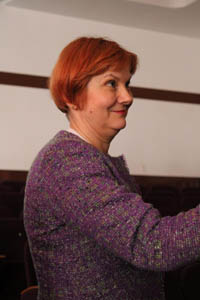 |
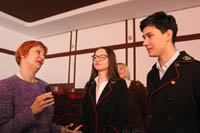 |
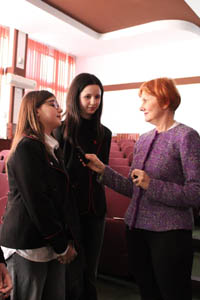 |
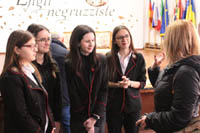 |
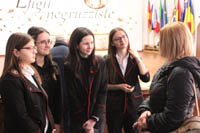 |
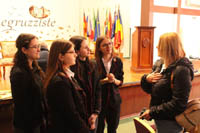 |
Translated by Carmen Badea,
University of Bucharest, Faculty of Foreign Languages and Literatures, MTTLC, year I
Corrected by Silvia Petrescu














